Using banana fibres to make hair extensionspublished at 16:35 BST 28 October 2022
Juliet Tumusiime is using banana fibres to make wigs and hair extensions as an alternative to synthetic hair.
Read MoreNigeria president plays down terror warnings by US
US orders diplomats to leave Nigerian capital for safety
'Fake Mr Bean' delights Zimbabwe and Pakistan
New Lesotho PM promises radical reform at swearing-in
Trailblazing Egyptian author Bahaa Taher dies
Thousands flee Togo homes as Islamist threat spreads
Mnangagwa confirmed as Zanu-PF election candidate
Malawi arrests 33 people at anti-corruption protests
Aid ambulance driver killed in Ethiopia
WHO calls for 'urgent' Tigray access to save lives
Car scam by Zimbabwe officials irks president
Cut corruption to curb Ghana crisis - ex-president
UN votes for Western Sahara talks to resume
Fire consumes a section of Kenya's Mount Longonot
Juliet Tumusiime is using banana fibres to make wigs and hair extensions as an alternative to synthetic hair.
Read More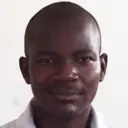 Ishaq Khalid
Ishaq Khalid
BBC News, Abuja
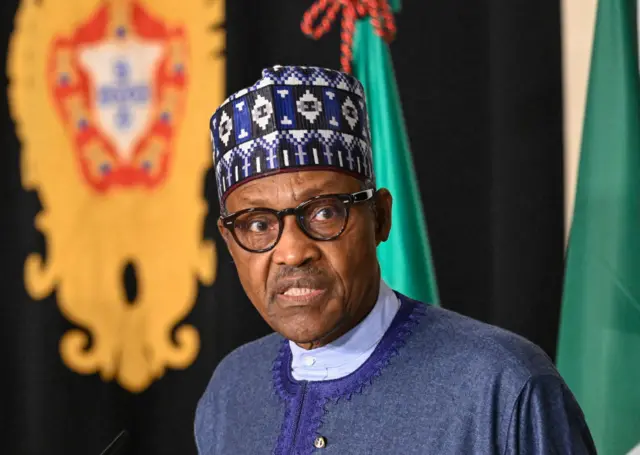 Image source, Getty Images
Image source, Getty Images"Terror is a reality the world over," the president says
Nigeria's president is urging people to "avoid panic" and "remain calm" in the wake of warnings by several Western countries of possible terror attacks in the capital, Abuja and elsewhere in the country.
The US, UK, Canada, Ireland and Australia have advised their citizens against travelling to Nigeria, and the US has gone a step further by ordering all non-essential diplomatic staff to leave.
In a statement on Friday, President Muhammadu Buhari downplayed the threat - saying security forces and citizens should stay "vigilant and careful" but that Nigeria was "no exception" in this regard, because the US and UK also warn of the "high likelihood of terror attacks in many Western European nations".
He added that Nigerians’ safety remains the "highest priority of government" and that "security agents are proactively rooting out threats to keep citizens safe – much of their work unseen and necessarily confidential".
Nigeria is grappling with several security challenges including violence by extremist groups and kidnappings for ransom by armed gangs.
"Unfortunately, terror is a reality the world over," and these latest alerts by Western countries do not mean "an attack in Abuja is imminent... security threats are real and have been with us for a long while," Mr Buhari said on Friday.
Tunisia could be excluded from the World Cup in Qatar if the country's government interferes in footballing matters, Fifa warns.
Read MoreRichard Kagoe
BBC News, Nairobi
Twelve police officers in Kenya face charges of crimes against humanity for their alleged role in offences committed during the 2017 election period, including the murder of a six-month-old baby.
The country’s chief prosecutor says investigations show that high-ranking officers bear greatest responsibility for atrocities committed in the stronghold of opposition leader Raila Odinga’s hometown of Kisumu, in western Kenya.
Director of Public Prosecutions Noordin Haji says the attacks were not spontaneous but were planned and coordinated by those officers.
He did not reveal the identity of the suspects, but has given the nod to charge the officers for various crimes committed under their authority - including murder, torture, and rape.
Iman Abdullahi Mohammed
BBC News Somali
 Image source, Suldaan Said Ahmed
Image source, Suldaan Said AhmedSuldaan Said Ahmed became an MP in Finland just over a year ago
Finland’s first Somali-born MP, Suldaan Said Ahmed, has wowed audiences gathered in London for the Somali Festival Week with his singing voice.
He was attending one of the events put on for the ongoing annual festival, which takes place during Black History Month in the UK.
The 29-year-old, who moved to Finland from Somalia’s capital, Mogadishu, in 2008, was on the bill to talk about the importance of Somali culture and the role it plays for Somalia’s large diaspora - many having left the country over the last three decades because of civil conflict.
Mr Ahmed treated the crowd to several famous Somali songs, one of which was Soomaaliyeey Toosoo, meaning “Somalis, Wake Up”. This even served as the country’s national anthem for 12 years until 2012. The lyrics underlie the Somali spirit of resilience, summed up in the phrase: “Do not let the enemy rule over you. You are a camel.”
People in the audience clapped along, others stood up to sing with him.
“In our Somali culture, arts and literature are very important to us, it’s used to convey messages,” the MP said.
This incapsulates the incentive of the festival, now in its 14th year - to showcase the diversity of Somalis through literature, poetry, art and music.
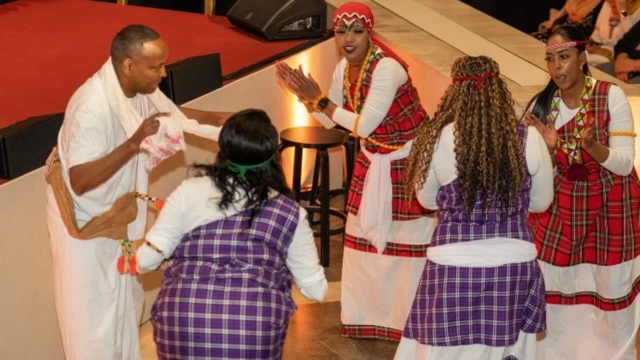
Traditional Somali dance group Qoraan performed this year
Events are also being held in Bristol and Leicester with people typically dressing up in their finest clothes to celebrate, some in traditional attire.
This year's festival launched hundreds of books and brought together many from the Somali creative arts, including photographer Nuura Alhuda who presented her book on Somaliland's wildlife and endangered heritage sites:
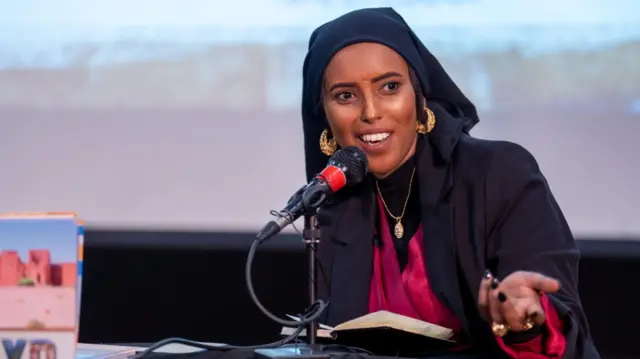
“Somali Week is not just for senior Somali artists on the map, but we encourage young artists in the UK, around the globe and also those back home," said Ayan Mohamoud, founder of Kayd Somali Arts and Culture, a London-based group.
The festival will end on Sunday evening with a concert by three big Somali music stars: Awaleh Aden from Djibouti, Ali Dhaanto from Ethiopia and Ikran Jama from the self-declared Republic of Somaliland.
Who could have predicted that Thursday's cricket match between Zimbabwe and Pakistan would end with the countries' political leaders trading banter about a Mr Bean lookalike?
Asif Muhammad is a Pakistani comedian who commentators online claimed visited an agricultural show in Zimbabwe a few years ago.
One disgruntled cricket commentator said Zimbabweans were disappointed to meet this "Fraud Pak Bean" because they'd expected to get the real "Mr Bean Rowan [Atkinson]", according to the Indian Express website.
Take a look at Mr Muhammad for yourself - a pretty good likeness, no?:
Allow X content?
This article contains content provided by X. We ask for your permission before anything is loaded, as they may be using cookies and other technologies. You may want to read X’s cookie policy, external and privacy policy, external before accepting. To view this content choose ‘accept and continue’.
And here's the exchange between the president of Zimbabwe and the prime minister of Pakistan, who apparently couldn't resist taking part in the Twitter chatter:
Allow X content?
This article contains content provided by X. We ask for your permission before anything is loaded, as they may be using cookies and other technologies. You may want to read X’s cookie policy, external and privacy policy, external before accepting. To view this content choose ‘accept and continue’.
 Pumza Fihlani
Pumza Fihlani
BBC News
There's been a jubilant atmosphere as Lesotho's new prime minister addresses cheering crowds at his inauguration in the capital, Maseru.
Bible verses and soothing church hymnals peppered his speech. But there was also serious business - Prime Minister Sam Matekane's tone taking on that of CEO addressing a boardroom, in a sign perhaps of how he intends to run things.
"We have to uproot corruption and stop the rampant embezzlement of public funds," Prime Minister Matekane said, adding "these things need to be done in order to restore the hope of our people and to solicit their buy-in as we prepare to launch the country into new horizons".
Mr Matekane also said Lesotho's wage bill was too big compared to investment in the country’s infrastructure.
He also talked about righting "historical wrongs to make Lesotho great again", in a country where politics has been fractious for at least a decade, with a series of fraught coalitions and numerous leaders ousted for alleged corruption and bad governance.
By contrast, Mr Matekane promised his government would work towards peace, accountability and transparency, tackling these key areas in the first 100 days:
Morocco defender Nayef Aguerd says his long-awaited debut for West Ham was a 'great' moment after a long-term ankle injury.
Read More Will Ross
Will Ross
Africa editor, BBC World Service
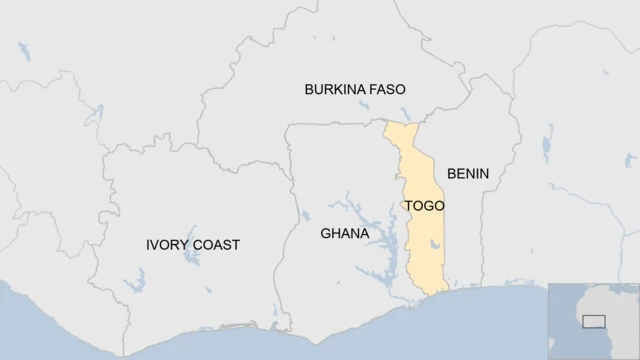
The government in Togo says more than 4,000 people have been forced to flee their homes this year following jihadist attacks in the north of the country.
Among the displaced are Togolese who had to leave their villages, and Burkina Faso nationals who had crossed the border to escape attacks by Islamist militants.
Correspondents say Togo, Benin, Ghana and Ivory Coast are increasingly concerned that the jihadist threat is spreading further south from countries in the Sahel region.
There have been at least five attacks in northern Togo over the last year.
The communications minister said victims of the violence were being helped with psychological support and displaced students would be offered education in schools within host communities.
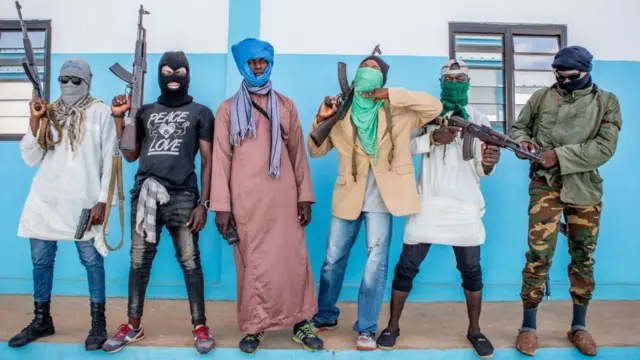 Image source, AFP
Image source, AFPTogolese policemen disguised as a terrorists take part in an anti-terrorism exercise
 Imogen Foulkes
Imogen Foulkes
Reporting from Geneva
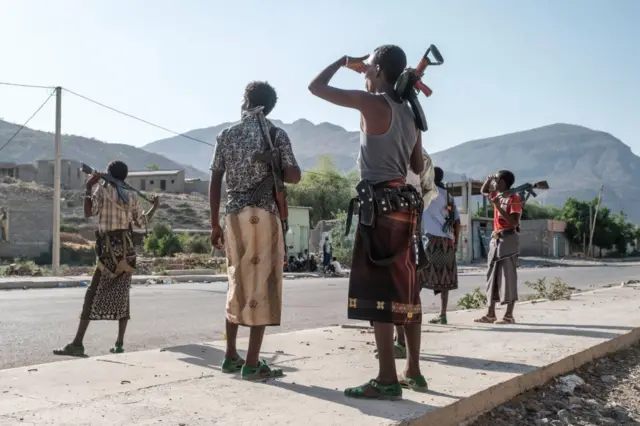 Image source, AFP
Image source, AFPAn estimated 13 million people need aid in northern Ethiopia
Officials from the World Health Organization (WHO) say access to northern Ethiopia is urgent to save the lives of millions of people facing a "perfect storm" of deprivation.
Cholera and measles outbreaks have been recorded in Amhara and Afar, where aid agencies have limited access.
In Tigray, where there has been no air or road access for eight weeks, the WHO is unable to get a clear picture of disease outbreaks.
However officials say childhood vaccinations have stopped and that supplies of IV fluids, insulin and antibiotics have run out. Fewer than one in 10 health centres are functioning.
There are acute shortages of food and fuel, with an estimated 89% of the population in Tigray now food insecure, and 29% of children suffering malnutrition.
Across Tigray, Amhara and Afar, the UN estimates that 13 million people need humanitarian assistance.
Earlier this month, the head of the WHO, Dr Tedros Adhanom Ghebreyesus, who is from Tigray, said there was "a very narrow window to prevent genocide".
On Friday, WHO officials would not be drawn on these comments, but repeated that access to Tigray was a matter of urgency.
Peace talks between the Ethiopian government and Tigrayan representatives began in South Africa this week, but have not led so far to any increased access for humanitarian organisations.
 Pumza Fihlani
Pumza Fihlani
BBC News
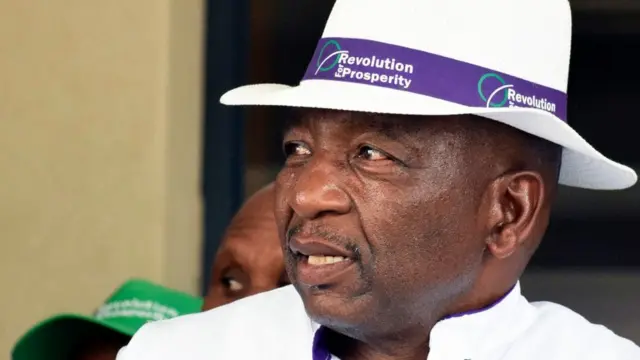 Image source, AFP
Image source, AFPSam Matekane is well-regarded in business but a novice in politics
Millionaire businessman Sam Matekane has been sworn in as Lesotho’s prime minister.
He took the oath of office in front of thousands of Basotho and presidents from southern Africa in the capital, Maseru.
The events including an air show are being live-streamed by the state broadcaster in neighbouring South Africa:
Allow YouTube content?
This article contains content provided by Google YouTube. We ask for your permission before anything is loaded, as they may be using cookies and other technologies. You may want to read Google’s cookie policy, external and privacy policy, external before accepting. To view this content choose ‘accept and continue’.
The 64-year-old is a well-regarded businessman in Lesotho but a novice to politics.
His six-month-old political party won the recent elections with a huge margin but fell short of the majority. He'll now lead Lesotho after forming a coalition with two smaller parties.
Political analysts see his victory as a sign that the people of Lesotho want a new kind of leadership.
Some hope his business acumen will translate to good governance and service delivery in the economically embattled country.
For a decade, none of Lesotho's political parties has garnered enough votes to form a government on its own. The country has, as a result, been run by coalition governments that have proved fractious, and no prime minister has served a full five-year term.
The small southern African kingdom has experienced political instability since 2012, including a coup in 2014 and three national elections in five years.
 Image source, Getty Images
Image source, Getty ImagesFour-wheel drives are said to be a popular choice (file photo)
Some Zimbabwe officials who drive taxpayer-funded cars are deflating their own tyres so they can buy the vehicles at lower prices, the president has said.
"My senior officers given government vehicles park them and deflate the tyres, and use the pool car to wait for time to expire so that they can acquire the vehicle quite new," President Emmerson Mnangagwa told the annual conference of Zimbabwe's government procurement transparency body days ago.
He paused as he delivered the lines, allowing members of the audience to laugh, the Times newspaper reports.
"If the workers discover that the boss’s car is deflated, they go and repair the wheel, and the boss silently deflates another," he explained.
"Meanwhile, he uses a pool car because he knows at the end of three, four, five years, he will get the car in excellent condition but at book value."
Mamelodi Sundowns Ladies are intent on defending their Women's African Champions League title in Morocco.
Read More BBC Monitoring
BBC Monitoring
The world through its media
Mali’s transitional president, Col Assimi Goïta, and Niger ex-president Mahamadou Issoufou met in Bamako on Thursday to discuss challenges affecting the Sahel region
It is not known if there were any decisive outcomes from their talks. But according to the former Niger leader, the pair spoke about security, climate, economy and social development challenges in the region.
Mr Issoufou was appointed chair, external of the high-level panel on security, governance and development in the Sahel by UN Secretary General António Guterres in September.
He said that his mission was to “assess various strategies that are currently being implemented to address the different challenges” in the Sahel.
The Sahel countries of Mali, Niger, Burkina Faso and Chad have in the past decade been shaken by militant attacks and inter-communal conflicts.
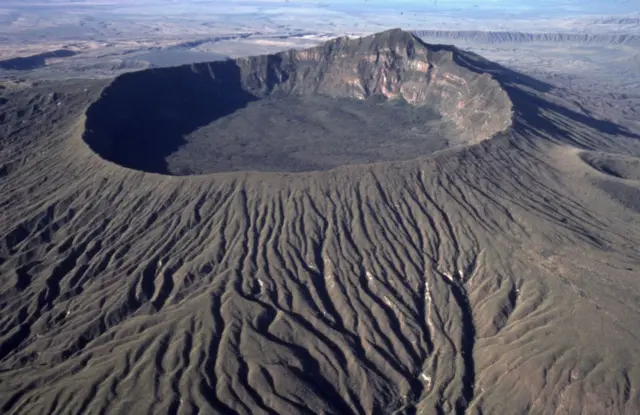 Image source, Getty Images
Image source, Getty ImagesThe mountain is a dormant volcano
A fire outbreak has consumed hectares of bushland in Kenya’s Mount Longonot, which is a popular destination for hikers in the Rift Valley region.
The Kenya Wildlife Service (KWS) says in a statement that it put out the fire that began on Thursday.
KWS refuted rumours circulating on social media that there had been a volcanic eruption, and said it wanted to "assure that the park is safe to all visitors".
The mountain, which is a dormant volcano, has been one of the most talked about topics on Twitter, with some users claiming they experienced earth tremors as a result of the supposed eruption.
The cause of the fire on the mountain has not yet been established.
Last year, a similar outbreak of fire reduced a portion of vegetation in the park to ashes.
 BBC Monitoring
BBC Monitoring
The world through its media
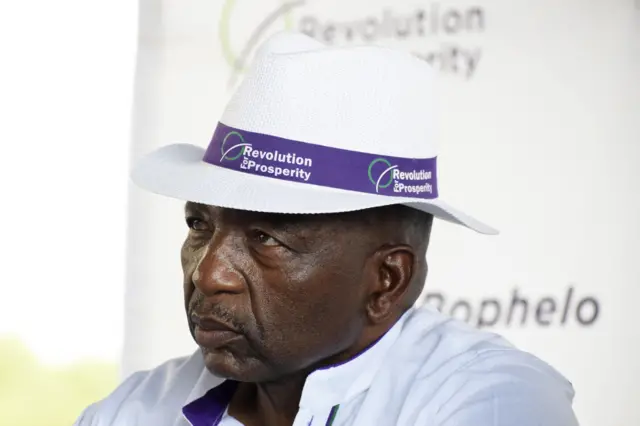 Image source, AFP
Image source, AFPSam Matekane is expected to be sworn in at Setsoto Stadium in Maseru
Diamond magnate Sam Matekane is due to be sworn in as Lesotho's new prime minister at Setsoto Stadium in Maseru, following the 7 October parliamentary elections.
His Revolution for Prosperity party, formed earlier this year, won the polls but failed to garner an outright majority in the 120-seat parliament, leading to the formation of a coalition government with the Alliance for Democrats and Movement for Economic Change parties.
According to the government website, external, over 30 heads of state and government have been invited to the swearing-in ceremony.
For a decade, none of Lesotho's political parties has garnered enough votes to form a government on its own.
The country has, as a result, been run by coalition governments that have proved fractious, and no prime minister has served a full five-year term.
The small Southern African kingdom has experienced political instability since 2012, including a coup in 2014 and three national elections in five years.
He spoke to Bola Mosuro from the BBC's Focus on Africa programme shortly after his election victory:
Sam Matekane outlines his plans for constitutional reforms
 Thomas Naadi
Thomas Naadi
BBC News, Accra
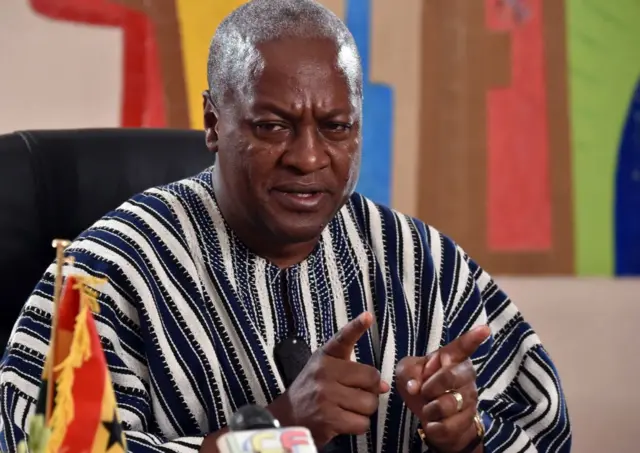 Image source, AFP
Image source, AFPFormer Ghanaian President John Dramani Mahama wants a reconstitution of the country's economic management team
A former Ghanaian president has urged the government to curb corruption and reduce the number of political appointees to address the current economic crisis.
John Dramani Mahama said state institutions with similar functions should be re-aligned to reduce pressure on the public purse.
Speaking at a forum dubbed Building the Nation We Want, Mr Mahama called for the dismissal of Finance Minister Ken Ofori Atta and a change of the government’s economic management team.
Some MPs had already demanded the resignation of the finance minister for poor economic management.
The country’s inflation has risen to 37.2% and the cedi is listed as the world’s worst-performing currency against the US dollar.
Mr Mahama urged the government to cushion the public against fuel price hikes with proceeds from the country's oil revenue.
President Nana Akufo-Addo will be addressing the nation on Sunday regarding the cost-of-living crisis.
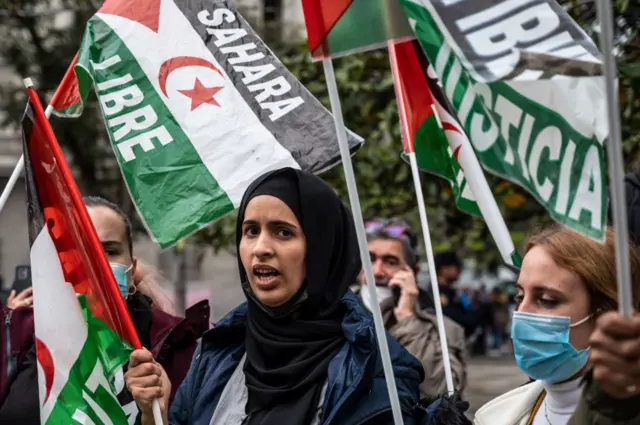 Image source, Getty Images
Image source, Getty ImagesWestern Sahara is disputed by the Algerian-backed Polisario Front and Morocco
The UN Security Council has voted for the resumption of negotiations between parties to the disputed Western Sahara.
The Thursday resolution called for the parties to resume negotiations "in good faith with a view to achieving a just, lasting and mutually acceptable political solution" for Western Sahara.
Thirteen countries in the 15-member council voted in favour of the resolution, with Kenya and Russia abstaining.
Western Sahara, a former Spanish colony, is disputed by the Algerian-backed Polisario Front and Morocco.
Morocco controls around 80% of Western Sahara and the rest is held by the Polisario movement - which fought with Morocco for years after Spanish forces withdrew in 1975.
The 16-year-long insurgency ended with a UN-brokered truce in 1991 and the promise of a referendum on independence which has yet to take place.
 BBC World Service
BBC World Service
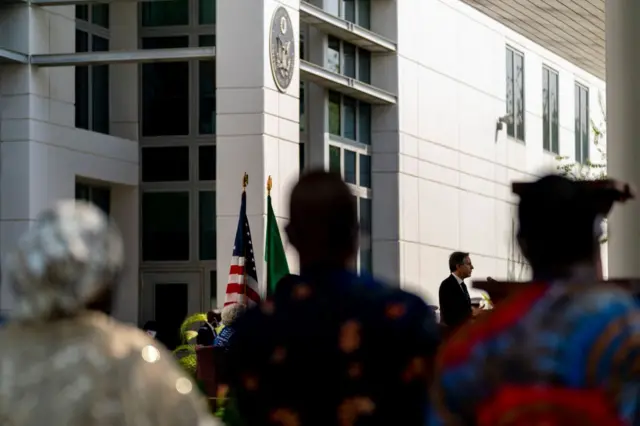 Image source, AFP
Image source, AFPThe US embassy in Abuja has advised US citizens not to travel to the city
The United States has ordered some diplomatic staff and their relatives to leave Nigeria's capital, Abuja, citing the risk of terror attacks.
The American embassy in Abuja has advised US citizens not to travel to the city.
It hasn't given any details of the potential threat.
On Wednesday the US made a similar warning for South Africa, saying people in Sandton - a wealthy neighbourhood in Johannesburg - should stay away from crowded areas this weekend.
President Cyril Ramaphosa said it was "unfortunate" that Washington hadn't spoken to his government before making the announcement.
Our proverb of the day:
Quote MessageClothes maketh the man."
A Beti proverb from Cameroon sent by Gertrude Onana in London, the UK
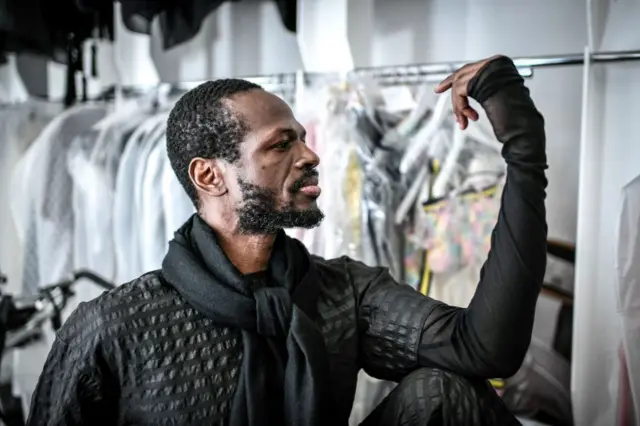 Image source, AFP
Image source, AFP